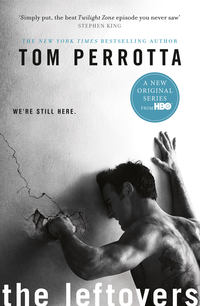
Полная версия
The Wishbones


TOM PERROTTA
The Wishbones

For my parents
This must be the death of rock ‘n roll….
—Todd Rundgren
Table of Contents
Epigraph
Part 1 - May
Chapter 1 - The Wednesday-Night Showcase
Chapter 2 - We're Soooo Thrilled
Chapter 3 - You've Got a Friend
Part 2 - June
Chapter 4 - It's Your Wedding
Chapter 5 - A Religious Experience
Chapter 6 - Are You Dave?
Chapter 7 - By The Way
Part 3 - July
Chapter 8 - Carlos and Stevie Ray
Chapter 9 - This Sad Gift
Chapter 10 - Randy by Starlight
Chapter 11 - Shiny Angels
Part 4 - August
Chapter 12 - War Pigs
Chapter 13 - Karma House
Chapter 14 - Wursthaus
Chapter 15 - You Still Here?
Part 5 - September
Chapter 16 - Fifteen Years in Fifteen Minutes
Chapter 17 - Dream of A Lifetime
Acknowledgements
About the Author
Praise
By the Same Author
Copyright
About the Publisher

THE WEDNESDAY-NIGHT SHOWCASE
Buzzy, the bass player, had a suspended license, so Dave swung by his house on the way to the Wednesday-night showcase. Buzzy did quality control for a company that manufactured prosthetic devices, and lived with his wife and two kids on a street of more or less identical split levels that must have seemed like an exciting place in the days before the British Invasion, back when Kennedy was President and Elvis was King. Buzzy was the only member of the wedding band who was married, a fact whose irony did not escape the notice of his fellow musicians. Artie, the sax player and manager, had just broken up with a girl who danced at Jiggles. Stan, the drummer and sometime accordionist, was sleepwalking through a painful divorce. Ian, the singer/keyboardist and all-around showman, was living at home with his parents, as was Dave, who handled rhythm guitar and background vocals.
Buzzy was waiting by the curb, a scrawny, pony tailed guy in a tuxedo and Yankees cap, with a beer in one hand and a guitar case in the other. He stowed his bass in the backseat, on top of Dave's Les Paul, and climbed in.
“Daverino,” he said, tilting the beer can in salute.
“Buzzmaster.”
Dave shifted into gear and headed for Central Avenue. The silence in the car was mellow, uncomplicated. Buzzy took a swig from the can and smacked his lips.
“Yup. Another Wednesday-night showcase.”
“You ready? The people are counting on you.”
Buzzy thought it over for a couple of seconds, then nodded.
“Coach,” he said, “I'm gonna play my heart out.”
Dave snorted his appreciation. The guys in the band liked to joke about the showcase, but they were careful not to complain—bookings had doubled since Artie found them the slot. And besides, goofy as it was, the showcase turned out to be a real time-saver: instead of scheduling separate auditions for every interested couple, the Wishbones could just tell prospective customers to come to the Ramada every third Wednesday of the month.
“You going out afterward?” Buzzy crushed the can in his hand and dropped it on the floor. “I'm in the mood for a few beers.”
“I can't. I'm supposed to go over to Julie's.”
“Hey.” Buzzy didn't bother to conceal his surprise. “You guys really getting back together?”
Dave didn't feel like going into the details. He had made a mistake telling the guys what had happened in the first place. He should have known he'd never hear the end of it. Now the incident had become part of band lore, like the night Ian got propositioned by the mother-of-the-bride, and that time Artie got his lights punched out by a Puerto Rican DJ.
“We've been talking on the phone. She says her parents aren't so upset anymore.”
Dave kept his eyes on the road. He didn't have to look to know that Buzzy was smirking.
“I wish I'd been there, man. Just to see the look on their faces.”
Dave grimaced. The look on their faces was the last thing he wanted to think about.
“We've been going out for a long time. I guess it was bound to happen sooner or later.”
“A long time?” Buzzy seemed to be deriving great pleasure from the conversation. “Fifteen years, Dave. You've been going out with the woman for fifteen years. Since your sophomore year of high school.”
$5.99 BUFFET, proclaimed the marquee outside the Cranwood Ramada. SHOWCASE OF MUSICAL TALENT. Dave pulled into the sparsely occupied lot, glad for the opportunity to change the subject.
“Looks like a slow night.” He put the car into park and shut off the ignition.
Buzzy wasn't about to give up so easily. “What are you going to say to her parents?”
Dave undid his seat belt and opened the door. It was a lovely spring night. Leaving the guitars for Buzzy, he stepped out of the car and started walking at a brisk pace toward the entrance of the Sundown Lounge. Buzzy had to run to catch up with him, the hardshell cases banging like luggage against the outside of his legs.
“Bring flowers,” he advised, panting a little from the exertion. “You'll need all the help you can get.”
Sparkle was Hearing the end of their set when Dave and Buzzy entered the lounge. Their lead singer, Alan Zelack, was strutting across the stage in his red sequined tux, belting out “My Girl” in the heavy-metal falsetto he'd perfected during years of touring with the Misty Mountain Revue, a wildly successful Led Zeppelin tribute show. Now everything he touched came out sounding like Zeppelin, from Sinatra to the Hokey Pokey.
Artie and Ian were sitting at a table in the corner, looking like a couple trapped in a bad marriage. Both of them seemed relieved by the arrival of some new blood.
“Guess what?” Buzzy said, before they'd even had a chance to settle into their chairs. “Dave's going over to Julie's later on.”
“No way,” said Ian.
“Bullshit,” said Artie.
Dave held up both hands in a futile plea for restraint.
“Don't ask. It's none of your fucking business.”
But it was already too late. The story had moved into the public domain. Artie turned to Ian, smiling nervously.
“Mr. Müller, sir? I'm not sure if you remember me. I'm Dave … Dave Raymond?”
Ian inhaled through his teeth, looking puzzled. “Sorry, Dave. The name doesn't ring a bell.”
“You know,” Artie added helpfully, “the guy you caught poking your daughter?”
Ian clapped himself in the forehead. “Oh, that Dave. How could I have forgotten. Come on in. Honey, guess who's here?”
Even Dave had to laugh at that. All day long he'd been dreading the thought of having to face Julie's parents. He'd run through a number of scenarios in his head, but none of them included the possibility that he'd have to jog their memories about the circumstances of their last meeting.
“If they don't recognize you,” Buzzy suggested, “you can always try pulling your pants down.”
Dave's bandmates traded high fives as Sparkle launched into “Stairway to Heaven,” their final song of every showcase performance. It was the secret of their immense popularity, the ultimate sales pitch to a generation that couldn't imagine a special occasion that wouldn't be made even more special by a faithful live version of what radio station after radio station had determined to be “the most popular song of alltime.”
“Fuckin’ Stairway,” mumbled Artie.
Ian glanced at the stage. “Look at that fool.”
Zelack was sparkling in the spotlight, eyes closed, mouth pressed lovingly to the mike as he crooned the immortal gibberish about hedgerows and spring cleaning. Dave pushed his chair away from the table.
“I can't listen to this shit,” he said, to no one in particular.
It Was better outside. The night was quiet and the air seemed reasonably fresh for this part of the world. Dave sat down on the curb by the fire lane and stared at the lopped-off moon glowing dully above the Parkway overpass. He liked being part of the Wishbones, and he liked the other guys in the group, but sometimes the showcase got to him. It was more the atmosphere than anything else, the unmistakable odor of mediocrity that seemed to be as much a part of the Sundown Lounge as the paper tablecloths and the green leatherette menus.
Alan Zelack pissed him off too, and it wasn't just the sequined tuxedo or his idiotic falsetto. Four years earlier, Dave had auditioned for the Misty Mountain Revue. He wasn't a huge Zeppelin fan, but he was unemployed at the time and would've killed for a chance to make some money playing rock ‘n roll on a regular basis. He kicked ass at the audition, nailing the “Heartbreaker” solo note for note, every bend, hammer, and blast of feedback accounted for. But he didn't get the job.
“You've got the chops,” Zelack told him afterward. “There's no doubt about that. But this is show business. You've got to look the part.”
The sad thing was, Dave knew he was right. Zelack looked like a rock star. He was tall and whip thin, with high cheekbones and the mutant jaw of a born singer. Dave, on the other hand, just looked like a regular guy. He was an inch or two shorter than average, maybe a bit on the stocky side. Once, out of curiosity, he'd squeezed himself into a pair of leather pants, and it hadn't been a pretty sight.
Tonight, though, he had bigger things to worry about than his inability to pass for Jimmy Page. The guys could laugh all they wanted; Dave was the one who was going to have to walk into the Müllers’ house and try to conduct some sort of halfway civil chitchat with people who wouldn't have to use their imagination to picture him hopping from foot to foot, naked except for a hot pink condom.
It was ironic in a way. He and Julie had been having sex since they were sixteen. They had been reckless back then—no self-restraint, no birth control, no common sense. They used to screw in the basement rec room with her parents right upstairs, snoring in dreamland. If they were going to be caught, they should have been caught back then, at the height of their passion, back when they used to stare at each other's bodies in stupefied amazement, and compete to see who could say “I love you” more times in a single night. It didn't make any sense to be caught now, when they'd already been through an abortion, four different breakups, mutual infidelities, and so many bitter discussions about the future that they didn't bother to talk about it anymore. Not now, when Julie suffered from a more or less chronic yeast infection that had turned their lovemaking into a polite and tentative activity, full of murmured questions and apologies. Not now, when it was embarrassing enough just to be over thirty and still fucking in the rec room.
But Mr. and Mrs. Müller didn't care about any of that. They were supposed to have been in Atlantic City that afternoon, but Mr. Müller had forgotten his wallet, and hadn't realized it until two hours into the drive. So they'd just turned around and come on home—what else was there to do?— only to find their youngest daughter on her hands and knees on the rec room floor, and Dave kneeling behind her, singing along with the unbearably loud music blasting from the stereo (John Mellencamp, Julie's favorite), the volume of which had apparently concealed the noise of their arrival.
What transpired after that remained mercifully fuzzy in Dave's memory. All he really remembered was the bloodless shock on Julie's mother's face as he scrambled to his feet, his penis shrinking rapidly inside the neon condom (a random selection from a novelty assortment he'd purchased in Greenwich Village), only to discover that his right foot had fallen asleep.
“Mrs. Müller,” he'd assured her, reaching down like Adam to conceal his shame while unsuccessfully trying to balance on his left foot, “this isn't what you think.”
A Car door slammed. Dave looked up and saw a bulky, apparently perturbed man come jogging across the parking lot in a tuxedo. As he drew closer, Dave heard him mumbling to himself as he fumbled with the hooks of his cummerbund.
“Slow down,” he called out. “You're not late.”
Stan stopped running and peered in the direction of the voice, shading his eyes with one hand as though it were daytime.
“Dave?”
“Yeah.”
“What are you doing out here?”
“You got any better ideas?”
Stan's only response was to trudge over to the curb and sit down. After a couple of seconds he exhaled wearily and stretched his legs out in front of him, revealing a pair of battered work boots protruding like loaves from the cuffs of his black trousers.
“Artie's not going to like that,” Dave pointed out.
“I lost my good shoes,” Stan explained. “I turned the damn house upside down trying to find them. That's why I'm late.”
“Don't sweat it. It's only the showcase.”
“I looked everywhere,” Stan continued, an edge of desperation creeping into his voice. “I mean, what did they do? Get up and take a walk without me?”
Stan had been a wreck for the past couple of months, ever since his wife announced that she was leaving him for her boss, a fifty-five-year-old lawyer with strange puffy hair who appeared in his own TV commercials, encouraging viewers to consider legal remedies for a host of everyday mishaps and conditions. Never the most reliable guy to begin with, Stan had lately been screwing up on a scale that was beginning to jeopardize his situation with Artie, who insisted on running the Wishbones like a business. He'd been late for two gigs in the past month (once because he'd locked his keys in his car, and once because he'd driven all the way to the Royal Oak before remembering that the reception was actually at the Blue Spruce); on a third occasion he'd shown up on time, but without drumsticks.
“I don't try to fuck up,” he explained, as if Dave had inquired about this possibility. “I've just got a lot on my mind right now.”
“No problem.” Dave patted him on the shoulder blade. “It happens to everyone.”
Stan nodded for a long time, as though the secrets of the universe were being revealed to him one by one.
“Do me a favor,” he said. “Tell that to Artie.”
Phil Hart and His Heartstring Orchestra were tuning up on stage #2 when Dave returned to the lounge with Stan's hi-hat in one hand and drum stand in the other. Sparkle was breaking down their equipment on stage #1, and when they were finished, the Wishbones would begin setting up. The two stages—one at either end of the lounge—were the key to the smooth operation of the showcase.
As always, Phil and the boys opened with a surprisingly spunky version of “Celebration,” by Kool and the Gang—surprising, because with the exception of the drummer (Phil's grandson, a pockmarked recovering drug addict named Joey), everyone in the combo had more or less vivid memories of the Hoover administration. Walter, the piano player, whose hands shook terribly when he was doing anything but tickling the ivories, was rumored to be eighty-two years old.
Despite their age, powder blue uniforms, and schizoid repertoire, the Heartstring Orchestra was made up of real musicians, old pros from the Big Band era (the reed player's twin brother had apparently toured for a couple of years with Tommy Dorsey). When they shifted away from disco standards to songs that were better suited to their talents—“Chattanooga Choo-Choo,” “Paper Doll,” “Boogie-Woogie Bugle Boy”— you couldn't help but notice a change of weather inside the Sundown Lounge. Fingers started snapping; heads began to bob. It wasn't unusual to see a natty-looking older couple—the Orchestra specialized in second and third marriages—put down their drinks and take a graceful turn around the dance floor.
Phil Hart himself wasn't the greatest singer in the world, but he was a true showman. The man had style. Dave always took a moment to admire his distinctive way of moving onstage, a high-elbowed liquidy sway that was the essence of geriatric cool. If you asked, Phil would happily reveal the secret of his remarkable vitality.
“Artificial hips!” he'd exclaim, shaking his head at the marvels of modern technology. “I can wiggle again!”
One of the things Dave liked best about the wedding band was its efficiency. They could set up in twenty minutes and break down even faster than that. Some of the rock bands he'd played in had been weighed down by so much equipment that he'd felt more like a roadie than a musician. Lockjaw was the worst offender. He remembered an outdoor Battle of the Bands where they'd taken four hours to set up for a forty-five-minute performance marred by such earsplitting shrieks of feedback that even the die-hard headbangers in the audience were squeezing their ears, begging for mercy. (Lockjaw came in fifth out of five bands and dissolved a few months later.)
The Wishbones made music on a more human scale. Dave had joined the band with a number of reservations—the uniforms, the cheesy tunes, Artie's reputation as a ballbuster—but he quickly came to realize that the rewards went far beyond the two hundred dollars he got for playing a four-hour gig.
It turned out, amazingly enough, to be a blast. People drank at weddings. They danced like maniacs. They clapped and hooted and made requests. Every now and then, when the chemistry was right, things got raucous. And when that happened, the Wishbones knew how to crank up the volume and rock, with no apologies to anyone.
Dave had friends who were still chasing their dreams, playing in dingy clubs to audiences of twelve bored drunks, splitting thirty-nine dollars among four guys at the end of the night, then dragging themselves home at three o'clock in the morning. He saw the best of them growing exhausted and bitter, endlessly chewing over the thankless question of why the world still didn't give a shit.
Dave himself still hadn't completely surrendered his dream of the Big Time, but he had moved it to the back burner. Someday, maybe, the perfect band would come along, a band so good that no one would be able to say no to them. Until then, though, Dave was a Wishbone, and it was a helluva lot better than nothing.
Afterwards, because the event came to seem so significant in retrospect, he sometimes found himself trying to reconstruct it in his memory, as though the smallest detail might hold the key to some larger mystery.
The Wishbones had just finished setting up when the Heart-string Orchestra broke into “Like a Virgin,” their next-to-last tune of the night. If Madonna had happened to wander into the Sundown to check out the showcase, Dave thought she would have approved. Phil Hart gave the song a hilarious deadpan interpretation, as though it had never entered his mind that some people might find it amusing to see a seventy-three-year-old man with artificial hips doing a dignified shimmy at the mike stand as he sang about being touched for the very first time.
Dave leaned his guitar against his amp and stepped down from the rickety wooden platform that served as stage #1. He waved to the waitress, a brassy-haired woman of indeterminate age named Hilda, and mimed the act of bringing a glass to his mouth. Hilda nodded, but moved across the lounge in the opposite direction to wait on some paying customers, a young couple holding hands across the table and gazing at each other with that blissful prenewlywed intensity that would somehow evolve over the next two decades into the vacant stares of the long-married. It wasn't until Ian sidled up to him a few seconds later that Dave realized he'd been frozen in place, the invisible empty glass still tilted to his lips.
“Mick Box,” said Ian.
“Shit,” said Dave.
At every Wishbone function, Ian tried to stump Dave with a piece of rock trivia. He specialized in obscure British musicians from second-rate bands of the early seventies.
“Take your time,” Ian taunted. “It'll come to you.”
“Mick Box,” Dave chanted. “Mick Box … Mick Box … Mick Box …”
“You probably haven't thought about this band for fifteen years.”
A face began to take shape in Dave's mind. Narrow, ferrety features. The obligatory hair.
“I'm seeing a mustache,” he said.
“If it's a Fu Manchu, you're definitely getting warmer.”
“I want to say Mott the Hoople, but that's Mick Ronson.”
Dave's eyes strayed around the lounge as he attempted to place the mustachioed Mick in a band he hadn't thought about for fifteen years. Up on stage #2, Phil Hart was twisting his way through a musical interlude in “Like a Virgin.” On stage #1, Artie was lecturing Stan about proper Wishbone attire, frowning and jabbing his finger in the direction of the offending work boots. Stan kept nodding like a kid, mouthing the words, “Okay, okay,” over and over again.
“I give up,” said Dave. “Is it Slade?”
“Close,” groaned Ian. He winced as though pained on Dave's behalf. “Mick Box was in Uriah Heep.”
“Damn. I used to love Uriah Heep.”
“Easy Livin',” agreed Ian. “One of the great tunes of all time.”
“Mick Box,” laughed Dave. “What the fuck kind of name is that?”
In the middle of the lounge, the gazers were still enraptured with one another while Hilda stood by, pencil in hand, looking bored. At a nearby table, Alan Zelack touched wineglasses with a ridiculously beautiful woman in a slinky black dress who appeared to have materialized out of nowhere. With the sixth sense of a complete asshole, Zelack turned slowly, grinning with triumphant smugness, and raised his glass in greeting. Dave pretended not to notice.
“What the fuck kind of name is Uriah Heep?” Ian wondered.
That was when it happened. Dave looked up just in time to watch Phil Hart stop singing in the middle of the final chorus. A look of mild surprise passed across his face—recognition, Dave would later decide—as he turned slightly to the left. He wobbled— there was no other word for it—and the microphone slipped through his fingers, bouncing off the stage with a percussive cough of static.
Joey stopped drumming and looked around in alarm. Phil remained upright for a moment, empty-handed and wonder stricken, before sinking, almost gently, to his knees. Walter kept pounding his electric piano, oblivious to everything but the final measures of the song. Phil's eyes got big. He flung his arms wide like Al Jolson, as if to embrace his fate, and then pitched suddenly forward, landing facedown on the stage in a position he never would have chosen if he'd been offered even the slightest amount of choice in the matter.
Two hours later, drained and without flowers, Dave pulled up in front of Julie's house. He sat in the car for a few minutes listening to the engine tick, trying to work up the energy to open the door.
For the first time in his life, he had actually watched someone die—a man he liked and admired—and for the moment, at least, everything else seemed insubstantial, not fully serious. The thought of facing Julie's parents no longer disturbed him. Instead he felt a strange tenderness, as though he were preparing to visit them in the hospital.






